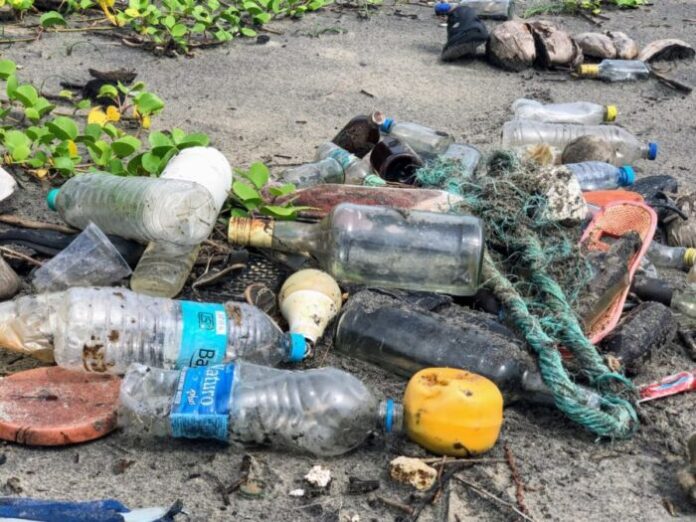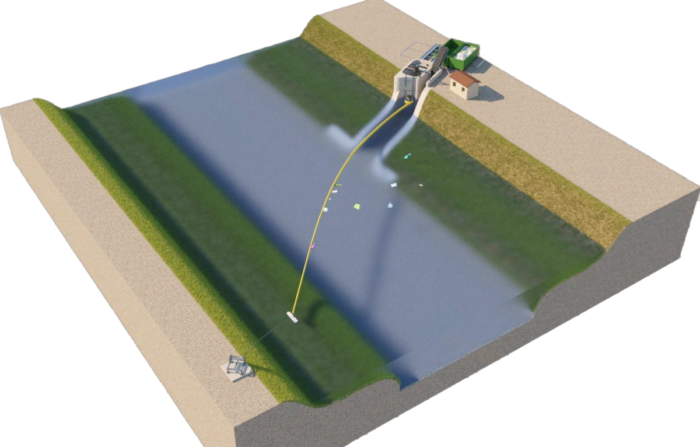
Plastic represents almost all of the waste found in the world’s seas and is the main waste found on the beaches. The Mediterranean Sea is today among the most polluted seas in the world because of the plastic which represents 95% of offshore waste. Europe, the second largest plastic producer in the world after China, pours between 150 and 500 thousand tons of macroplastics and between 70 and 130 thousand tons of microplastics into the sea every year.
The start-up Blue Eco Line, founded by four young Italians, Lorenzo Lubrano, Olimpia Rossi, Micheal Mugnai and Camilla Cantiani, started from this alarming figure and they have created a technological and sustainable waste collection system in rivers, which reduces the costs of the operation and maximizes results.
River Cleaner is an automated collection system, positioned on a bank of the river, which allows the collection of waste and its transport to the road surface, in complete autonomy. Once in the temporary storage bins, the plastic waste can be sent for disposal, with the regular means already available to the companies involved in the management of urban and extra-urban waste.
This allows you to install the plant in any portion of the river and guarantees its complete integration into the local waste disposal system, without the need to adjust the fleet for collection. Furthermore, being in operation 24 hours a day, it is possible to collect waste from the river in a continuous cycle, so as not to create obstructions within the riverbed.
“The River Cleaner project was born with the intent to combat the problem of ocean plastic pollution by acting before it disperses into the sea – reads on the Blue Eco Line website – During the design phase, it was fundamental for we, develop a solution that could be compatible with most of the river courses, but that could be integrated with the environment at the same time, so as not to have a high environmental and visual impact. A further objective that we set ourselves was to minimize costs and build a 0-emission plant. These constraints led us to design a completely automated system, remotely manageable, interconnected with the local waste collection companies, the which cost can also be amortized over the years “.
River Cleaner’s first pilot project is expected to start this year in Tuscany, where Blue Eco Line is in dialogue with public administrations, port authorities and remediation bodies. Within a month, the startup plans to leave with the feasibility study on a canal in Viareggio and then move on to Grosseto.

Unlike other startups that target consumers, the customers of this company are the public administrations that do not always manage to efficiently monitor the pollution of rivers. Blue Eco Line was founded in Florence at the end of 2018 and has just completed the fifth batch of Hubble, the acceleration program of Nana Bianca, the CR Firenze Foundation and the Foundation for research and innovation of the University of Florence.
In 2018 the problem of plastic in the oceans was placed among the six most serious environmental emergencies (together with others such as climate change, ocean acidification and loss of biodiversity). The fight against marine pollution, of which plastic is one of the main causes, constitutes one of the areas of action of the Sustainable Development Goal “Underwater life” of the 2030 Agenda.
The presence of intense human activities in the cities and along the coastal areas, the wind, the currents are all factors that strongly influence the dispersion of plastic in the sea. To these are added the waste brought by rivers that flow into the sea after passing through densely populated areas. The Mediterranean Sea is a semi-closed basin and influenced by intense human activities, characteristics that make it one of the most endangered seas in the world for plastic pollution, which accumulates in large quantities and remains there for long periods, breaking up into smaller and more insidious particles. In this sea, which represents only 1% of the world’s waters, 7% of the global microplastic is concentrated. Plastic pollution poses a serious threat to important economic sectors in the Mediterranean, especially fishing and tourism.



































